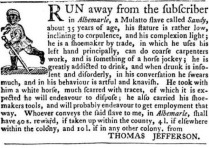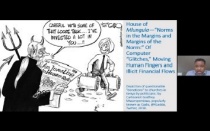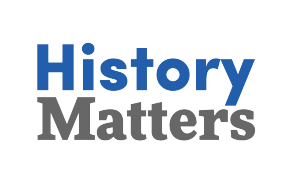
Faculty Updates
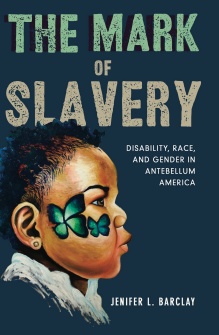
Jenifer Barclay published her first book, The Mark of Slavery: Disability, Race, and Gender in Antebellum America (University of Illinois Press, 2021). She also presented her work at the Organization of American Historians annual conference, the Schomburg Center for Research in Black Culture’s Lapidus Center conference and Suffolk University’s Embodied and Socially Constructed?: Dis/ability in Media, Law and History symposium. In Oct., the Massachusetts Historical Society hosted a workshop to support her new scholarship, a draft chapter of her second book project entitled “Her Yet Unwritten History: Black Women and the Education of Students of Color with Disabilities in the New South.” Barclay remains busy in her role as an associate editor of the Review of Disability Studies: An International Journal and is very excited to be co-editing with Stefanie Hunt-Kennedy (University of New Brunswick) a cutting-edge anthology Cripping the Archive: Disability, History, and Power.
Carole Emberton has a new book coming out in March 2022 with W.W. Norton, title To Walk About in Freedom: The Long Emancipation of Priscilla Joyner.
Sarah Handley-Cousins’ book Bodies in Blue: Disability in the Civil War North, was named the 2020 Outstanding Book by the Disability History Association. She received an ACLS Fellowship to spend 2022 researching her second project, “The Age of Crime: Disability, Crime, and Veterans in Gilded Age America.” Handley-Cousins also became the executive editor of the history blog, Nursing Clio. She gave the Robert W. Reeder I Distinguished Lecture in Nineteenth Century History for Youngstown State University in March 2021 and gave a talk for the New York Department of the Daughters of Union Veterans of the Civil War. She also had a blast playing several historical role-playing games with her students in the university's first Reacting to the Past course.
In addition to several articles and book chapters, David Herzberg nearly finished a new co-authored book, Whiteout: How Racial Capital Changed the Color of Heroin in America (with lead authors Helena Hansen and Jules Netherland), due out with University of California Press in 2022. He collaborated with Joseph Gabriel and Nils Kessel on an edited volume, Narratives of Risk and Benefit in Drugs and Medicines, still in preparation. Based in part on the research for his previous book White Market Drugs (2020) he also served as an Expert Witness in litigation related to the opioid crisis.
Hal Langfur received a grant from the Brazilian government to serve as a visiting scholar at the Universidade Federal Fluminense in greater Rio de Janeiro, but the ongoing disruptions of the pandemic in that country forced him to decline the invitation after several delays. Instead he hunkered down and finished his book manuscript, Adrift on an Inland Sea: Misinformation and the Limits of Empire in the Brazilian Backlands. The book is slated for publication at Stanford University Press in the late fall of 2022. As international travel resumed over the summer he was able to accept an invitation to deliver a keynote talk in Lisbon, Portugal, at the conference “Frontiers of Humanity and Beyond: Towards New Critical Understandings of Borders.” His visit was funded by the Center for the Humanities at the Universidade Nova de Lisboa and the Luso-American Development Foundation. Additional support from the Department of History’s Research Fund allowed him to add several weeks of archival research at the Portuguese National Archives, advancing his new project “Pedagogies of Racial Violence in Colonial Brazil.”

Yan Liu published his first book, titled Healing with Poisons: Potent Medicines in Medieval China (University of Washington Press, 2021, open access available). The book examines the use of poisons as healing agents during the formative era of Chinese medicine (200–800 CE), highlighting the fluid nature of medicinal substances as shaped by medical, political and cultural factors. He also published an encyclopedic essay, titled "Poisons in the Premodern World," which offers a comparative history of poisons between China and Europe. The essay appears in the Encyclopedia of the History of Science (May 2021, open access available). In addition, he has delivered a number of online talks on his new book in North America and in Asia.
Center for Diversity Innovation Visiting Distinguished Scholar, Vanessa Holden presented “Digital Footprints: The Freedom on the Move Project” in Feb. 2021
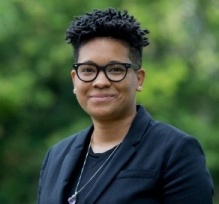
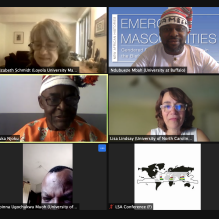
Ndubueze L. Mbahparticipating in an international roundtable on his book, Emergent Masculinities organized by the Lagos Studies Association in June 2021
Ndubueze L. Mbah participated in an international roundtable on his book, Emergent Masculinities: Gendered Power and Social Change in the Biafran Atlantic Age, organized by the Lagos Studies Association in June 2021. Mbah was invited by the Susan B. Anthony Institute for Gender, Sexuality, and Women's Studies at the University of Rochester to discuss his book with the Department of History's honors class in April 2021.
Mbah continues to work on his second book, "Rebellious Migrants: Forging Abolition, Cosmopolitan Identities, and Postcolonial Spaces in West Africa, 1840-1960." He presented research from this project in "Research Seminar in Gender and African History" in Dec. 2020 at the University of Reading, UK. In Feb. 2021, Mbah presented research from his second book project at "Empire, Sovereignty, and Labor in the Age of Global Abolition" organized by the McNeil Center for Early American Studies at the University of Pennsylvania. His paper was entitled, "Rebellious Migrants: The Freedom and Abolition Politics of 'Liberated Africans' in Old Calabar, 1850-1891."
Over the spring and summer of 2021, Mbah submitted an article on "African Masculinities" to the Oxford Bibliographies in African History, a second article on "Liberated African" returnees to Old Calabar to the Radical History Review and a third article on Nigerian women migrants to Fernando Po and Gabon to History in Africa: A Journal of Debates, Methods, and Source Analysis. In addition, Mbah completed reviews of two books on global slavery and African American migration to Liberia.
Center for Diversity Innovation, Visiting Distinguished Scholar Prof. Nicholas Githuku, presented “House of Mlungula – ‘Norms in the Margins and Margins of the Norm:’ Of Computer ‘Glitches,’ Moving Human Fingers and Illicit Financial Flows” in March 2021.
Erik Seeman participated in a roundtable discussion of his book, Speaking with the Dead in Early America (2019). An edited transcript of the conversation will appear in a special issue of Body and Religion in spring 2022, along with his essay, “Corpses and the Protestant Cult of the Dead.” He also delivered the keynote address at the conference “The Moment of Death in Early Modern Europe, 1450-1800,” held in Erfurt, Germany. (Well, actually he sat in a hotel room in Frankfurt to be in the same time zone as the all-European lineup when the conference was moved online.)
Kristin Stapleton completed a draft of a study on the idea of the “modern city” in Asia since the late nineteenth century, which required her to immerse herself in works on cities in Southeast and South Asia to supplement her expertise on East Asia. She hopes the reviewers will approve but also offer many helpful suggestions to strengthen it. She continues to work on her translation of a Chinese novel set in WWII, which should be completed this year. For her next major project, she is contemplating a new book on “the greatest love story in world history” to be co-authored with a former UB undergraduate history major. Since the project is in the early planning stages, she doesn’t want to reveal too much about it. Check back next year for more details!
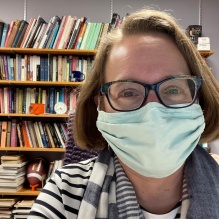
Claire Schen
Tamara Plakins Thornton is spending fall 2021 as a National Endowment for the Humanities Fellow at the American Antiquarian Society, working on her fourth book project, "Globes and the Global Imagination in Early America: A Study in People, Ideas, and Objects." This past summer, she served as a co-mentor for a dissertation workshop in the History of Science and Technology at the 2021 conference of the Society for Historians of the Early American Republic (SHEAR) and gave a paper at the conference titled “How to Think about Human Difference: The Antipodes in the Eighteenth and Early Nineteenth-Century American Spatial Imagination.” She gave a similar paper in New Orleans at the Nov. 2021 conference of the History of Science Society. She also finished up her three-year elected term on the SHEAR Advisory Board. Thornton’s article, “‘A Most Astonishing Genius for Calculations’: Arithmetical Prodigies, the Science of the Mind, and Human Difference in the Early Republic,” will be appearing in a 2021 issue of the Journal of the Early Republic.
Victoria W. Wolcott has been present at a variety of zoom talks and conferences. In the spring she gave an online talk, “Changing Narratives of the Public Realm” for Garden and Landscape Studies at Dumbarton Oaks, Washington, D.C. In Sept. 2021 she gave an online talk as part of the symposium “African American Urban History from Past to Future Tense: Thoughts on a State of the Field,” at Carnegie Mellon. That same month Wolcott celebrated Robert Owen’s 250th birthday with another online talk, “Black Owenites: Cooperation and the Long Civil Rights Movement.” Wolcott organized and moderated an online symposium, “Black Utopias in a Post-Pandemic World,” for the Humanities Institute in Nov. 2020 and gave a talk on the Father Divine movement for the Sept. 2021 Humanities Festival. She also appeared in a new documentary film, Boblo Boats: A Detroit Ferry Tale. In fall 2020 her article “Networks of Resistance: Floria Pinkney and Labor Interracialism in Interwar America,” was published in the Journal of African American History. Her review essay on Lizabeth Cohen’s Saving America’s Cities, appeared in the Reviews in American History. Finally, her book manuscript, Living in the Future: Utopianism and the Long Civil Rights Movement, will be out in Feb. 2022 with the University of Chicago Press.
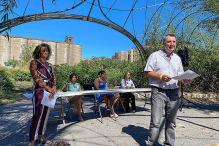
Dalia Antonia Caraballo Muller and three of her undergraduate students (from left, Suhana Monsalve, Alexis Harrell and Stephie Ikama) opened the 2021 Humanities Festival with a presentation on “The Impossible Project.”
Gene Zubovich began his fellowship at the Kluge Center at the Library of Congress in June 2021 to start research on his new book project, “Culture Warriors Abroad: A Global History of the US Culture Wars.” He also received an NEH Summer Stipend in support of this project. In Dec. 2020, Zubovich published “William Ernest Hocking and the Liberal Protestant Origins of Human Rights” in Christianity and Human Rights Reconsidered (Cambridge University Press), which investigates the United States’ first human rights theorist. In Jan. 2021, he published “American Protestants and the International Origins of the 1960s Democratic Revolution” in Diplomatic History, which looked at the religious origins of the New Left. In June 2021, he chaired a panel at the Society for Historians of American Foreign Relations (SHAFR) and is serving on the organization’s 2022 program committee. Zubovich received a Julian Park Publication Grant for his book, Before the Religious Right: Liberal Protestants, Human Rights and the Polarization of the United States, which will be published by the University of Pennsylvania Press in March 2022.
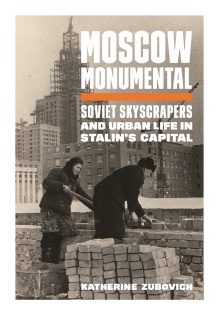
Katherine Zubovich published Moscow Monumental: Soviet Skyscrapers and Urban Life in Stalin’s Capital in Dec. 2020. The book has been shortlisted for the Pushkin House Russian Book Prize. It was also picked up by the Moscow-based publisher Corpus and is being translated currently into Russian. Katherine had a lovely time launching the book virtually with her UB colleagues in Dec. 2020, and she gave a number of Zoom book talks in the following months at the University of Manitoba, University College London, Columbia, Berkeley and the Skyscraper Museum in New York City. In fall 2020, Katherine also participated in a roundtable on the apt topic of “Anxiety in Russian and Soviet History” at the Association for Slavic, East European and Eurasian Studies virtual conference. She worked on a short book titled Making Cities Socialist, and she enjoyed meeting and teaching UB students in the fall and spring semesters. In July 2021, she was awarded the James H. Billington Fellowship at the Kennan Institute of the Wilson Center in Washington D.C., where she is spending the 2021-22 academic year working on a new book about Soviet visual statistics.
Previous article: Undergraduate Student News
Next article: Graduate Student Updates
